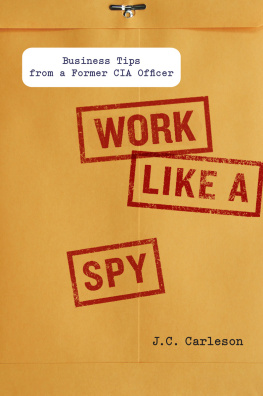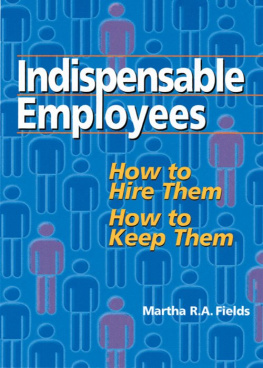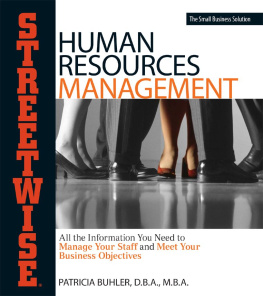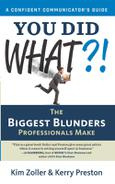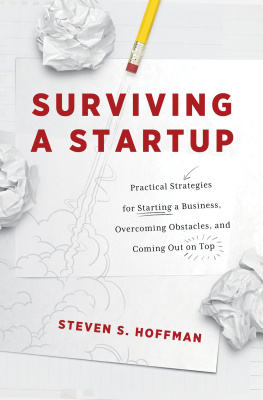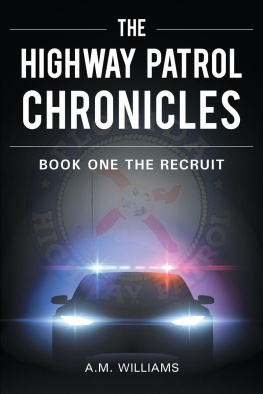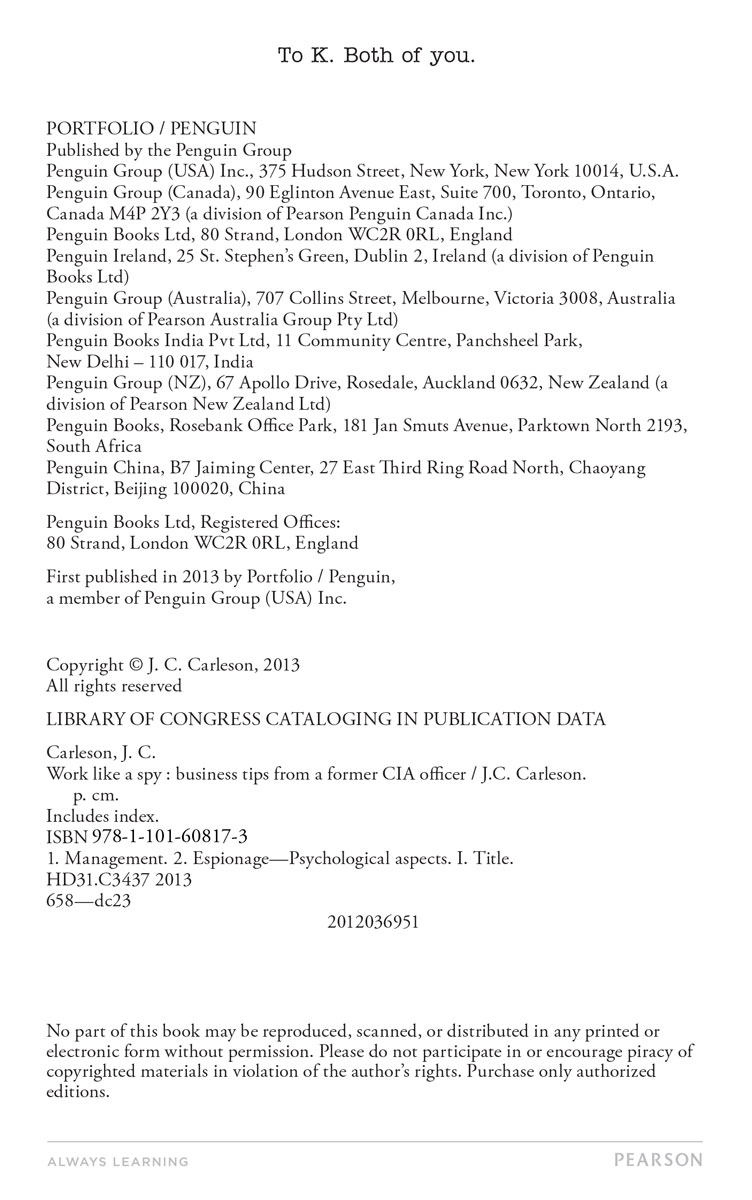All statements of fact, opinion, or analysis expressed are those of the author and do not reflect the official positions or views of the CIA or any other U.S. government agency. Nothing in the contents should be construed as asserting or implying U.S. government authentication of information or agency endorsement of the authors views. This material has been reviewed by the CIA to prevent the disclosure of classified information.
CONTENTS
A Note from the Author
W orking as an undercover CIA officer more or less ruins your chances of ever being satisfied again in a more traditional job. So when I started thinking about leaving the agency after spending nearly a decade as a clandestine service officer, I found it hard to imagine going back to a job that required normal business attire, had a predictable schedule, and didnt ever involve the use of an alias. Given the choice, Id pick a war zone assignment over a cubicle any day.
And yet it was clear to me that I had reached a plateau in my career and it was time to make a change. Still, quitting my job as a case officer for the Central Intelligence Agency was a difficult choice. Sure, a clandestine career has plenty of drawbacks: mind-numbing bureaucracy, too much time living out of a suitcase, constant lies to friends and family. But working for the CIA presents opportunities and challenges that no other employer in the world can match. It can be fabulously rewarding, and although Hollywoods depiction of a CIA career is 98 percent inaccurate, it does have its share of glamorous moments, as well as its pulse-quickening, adrenaline-rushing ones. But I had come to a point where further career advancement would have required personal sacrifices that I wasnt willing to make. I had a family I wanted to see more. I wanted to engage in normal conversations at cocktail parties and backyard barbecues without having to excuse myself whenever the inevitable and what do you do? question arose. The globe-trotting that had previously seemed a wonderful adventure on the governments dime now had me shudder at the thought of yet another international flight and yet another night in another hotel room. I have absolutely no regrets about my time in the CIA, but I wanted my life and my identity back.
I had a choice: I could make a new career for myself within the clandestine service in a headquarters management role, or I could quit and rejoin the civilian world. There was some comfort in the thought of sticking with the CIA, albeit in a different capacity, but the truth is that I share the field officers aversion to becoming a cog in the headquarters machine.
I had plenty of other skills besides espionage, I told myself. Before joining the CIA, I had hopped from one corporate job to the next. An Ivy League degree and the heady days before the dot-com bubble burst had made it possible for me to dabble in various industries in various capacities, always changing jobs quickly before boredom set in. Granted, I never found a position or a company that I enjoyed for more than about a years time, but I gained plenty of experience in the normal world outside of the clandestine service.
Upon dusting off my decade-old pre-CIA rsum in search of updatable skills, then, I was surprised to discover that my career in the CIA had taught me more valuable, business-applicable skills than all of my previous corporate positions combined. Granted, not all of my clandestine skills were directly transferableat least not without the risk of a prison sentencebut they were not nearly as esoteric as I had originally assumed.
This thought process and personal career exploration ultimately led to my decision to write this book. Moreover, I realized that although the CIA employs a constant stream of contractors from the outside world, the outside world rarely gets to benefit from the experience of clandestine service officers. That is, in part, simply because there arent many of us floating around the private sector. It also stems from the fact that even after leaving the agency, many people find it hard (or inadvisable) to give up their cover stories. Widely broadcasting a previous career as a CIA officer can invite very strong reactions, ranging from curious to confrontational.
Even as this book started to take shape in my mind, though, I hesitated. I had no desire to write a tell-all; I dont have any intention of leaking classified information or revealing data that could compromise any person or operation associated with the CIA. Former insiders who leak information are much reviled inside the agency, and I hated the idea that anyone would lump me in with that group. In addition to getting my manuscript approved by the CIAs internal review board prior to publication, as required of all former employees, then, I also set about writing this book very carefully. On the one hand, I truly believe that the corporate world can learn a great deal from some of the practices within the clandestine world, and I wanted readers to have the benefit of examples and anecdotes that illustrate the points discussed in the book. On the other hand, I know how to keep a secretand there is a great deal of information classified as top secret for very good reason.
My goal in this book is to walk the fine line of sharing enough information for the material to be usable and useful, without giving away any sources or methods that could jeopardize past or present operations. Particularly in the early chapters, therefore, I sometimes rely on hypothetical examples to introduce broad concepts. This does not mean that the examples are untrue or fabricatedjust that I used composite characters and situations, and changed the details enough to obscure the underlying people and places. All of the examples that describe my personal experiences are very much true, and very much my own. Again, however, I endeavored to eliminate any detail that could lead to the identification of the other people or places involved.
Purists and former colleagues may object to my interchangeable use of various phrases. So to put the sticklers at ease, lets set the record straight: CIA officers are not spies. A spy is someone who commits espionage against his or her nation. CIA officers recruit spies. Yet in the pages of this book I make use of a whole slew of phrases to describe CIA officers from the National Clandestine Service: case officer, clandestine service officer, undercover officer, andyesonce or twice, even spy and spook. All but the last two are accurate, and those are only used flippantly for effect.
The bottom line is that I very much enjoyed my undercover career, and I have immense respect for my former colleagues. This book is intended to share just a small fraction of the wonderful tricks of the clandestine trade with an outside world that stands to benefit.
CHAPTER ONE
Clandestine Concepts Go Corporate: Basic Principles of Intelligence Collection
I n the summer of 2003 I had the dubious distinction of being part of the CIAs weapons of mass destruction search team in Iraq. I arrived in Baghdad during an awkward time of investigative limbothe administrations official position was still that there were weapons of mass destruction hidden in or near Iraq. The evidence, however, was increasingly pointing to the opposite conclusion. The CIA teams orders were a half-vague, half-desperate command to leave no stone unturned in our search.

